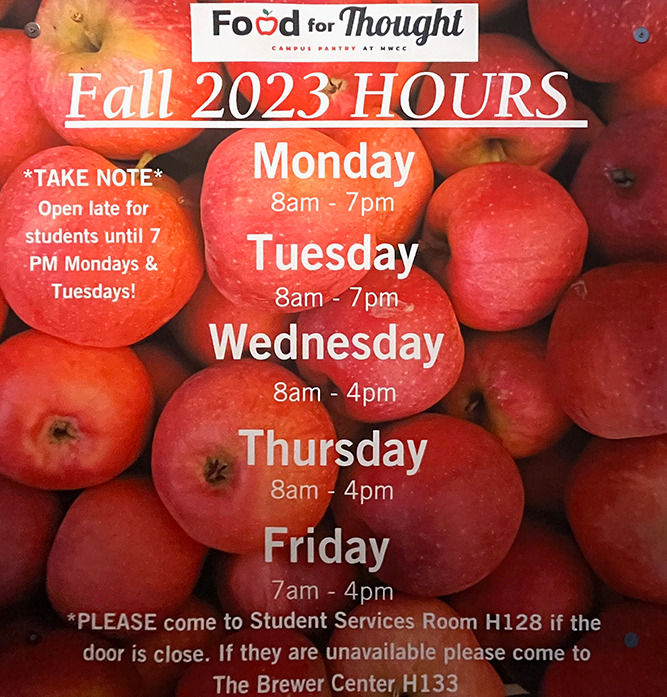Investigating Food Insecurity at MWCC
By Desiree Leader | Observer Contributor

According to the Massachusetts Department of Transitional Assistance, 1 out of 7 people in Massachusetts receive Supplemental Nutrition Assistance Program (SNAP) benefits, formerly known as food stamps. Food insecurity is a global issue, and it is no different at the Mount.
With a recent reduction in additional supplemental benefits, the local demand on food pantries is at an all-time high. According to Pam Guild, President of the Board of Directors at the Wachusett Food Pantry in Sterling, there has been a major uptick in recipients during and since the COVID-19 pandemic because “prices are going up all over for basics.”
This can also be seen at the food pantry at Mount Wachusett Community College. According to Mike Mosher, a May graduate who is doing a work-study at the Mount, 100 new students registered for the food pantry in September, bringing the total who benefit from its services to about 750 students. Mosher, who helps out in the Brewer Center as well as the Food Pantry, explained that 100 more recipients equates to “1500 [more] snacks as well as 3,000 more food items.”
For both Mount Wachusett Community College and the Wachusett Food Pantry, a good portion of the items come from the Worcester Food Bank. They both also receive some monetary donations that help them buy some of the necessities needed. At the Mount, fresh produce boxes are obtained from Growing Places, a non-profit organization in Leominster, Massachusetts. They get 12 boxes a week, and they are given to students on a first-come, first-served basis.
Mina Girouard, a work-study student in the Brewer Center, said that food scarcity is especially an issue for “those who are making too much to qualify for SNAP benefits.” In her experience, a lot of the people who benefit from the food pantry are single parents, and it can be difficult for them to obtain healthy food as “the cheapest thing is ramen” but the food pantry at the Mount offers healthier choices for them and their children.
Assistant Dean of Students Sabine Dupoux informs that there is not only a pantry on the main campus in Gardner, but there is one at the Leominster campus, as well. As a matter of fact, when the campus was redesigned, one of the first things she did was to ensure that the pantry was in an area where it would be visible and easily accessible for all. As a result, it is located right by the back parking lot entrance, where students can see it right where they come in. “We’re developing things that we’re doing within our food pantry services; we’re doing it all with the student in mind,” she explained. She credited some of the increase in use of the campus food pantry to several things, including its being announced at student orientation and the rise in the cost of food and reduction of food-related benefits.
There are no income guidelines or verifications necessary to receive food services at the school. Mosher indicated that every student is eligible and can pop in and grab lunch, a snack, and a drink anytime they’d like. The pantry is there for every student enrolled in at least a one-credit course. They only need to register.
As for whether students are aware of the food pantry or not, Kayleigh Raskett, a Gateway student, explained that she is aware because she has friends that have benefited from it. David Simpson, another Gateway student, knows people that struggle. He has friends that use the food pantry and thinks it is a “super awesome program!”
But new student orientation is not the only way the word is getting out. Makenna Mongeon, another student at the Mount, was made aware of it through her nutrition professor. She believes that food is “pretty expensive for something everyone needs to survive.”
What are ways that residents and students can help with the issue of food insecurity? Food pantries are a great place to start. Guild recommends volunteering at your local pantry, for starters. “We always need volunteers,” she declared. She also suggested organizing a food drive or writing a donation check.
When asked about donations, Assistant Dean Dupoux stated that non-perishable items are always needed, and canned goods such as meat and vegetables can go a long way. She also suggested that special items such as cake mix and frosting can be helpful for a family celebrating a birthday. When donating, it’s important to check expiration dates, as pantries cannot accept expired food. There is also a big demand for can openers.
The most important thing, she mentioned, is that we talk about these issues and have those difficult conversations. Once we get rid of the stigma surrounding food insecurity, it will be easier to combat it. “Having access to healthy food is a basic need,” said Dupoux.
Thanks to local food pantries, we can begin to fulfill that need.
Comments are closed.